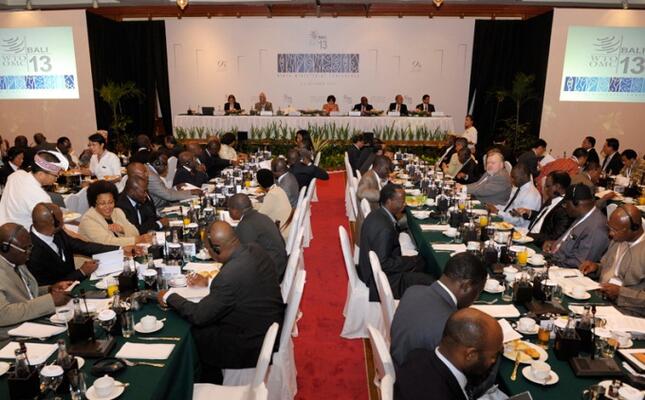
ITC welcomes trade facilitation agreement, offers assistance in implementation
(BALI, INDONESIA) — "Today is a good day for small business exporters in developing countries," said ITC Executive Director Arancha González, welcoming the multilateral Trade Facilitation Agreement agreed by trade ministers in Bali, Indonesia earlier today. The deal will lead to the creation of new jobs, many of them for small and medium-size enterprises (SMEs) in developing countries, she said.
The agreement, which will cut red tape, ease and harmonize customs formalities, is expected to increase global GDP by US$ 1 trillion and create 21 million jobs, according to the Peterson Institute for International Economics. Exports of developing countries are expected to expand by 10%, more than double the growth of 4.5% expected for developed economies, according to the WTO.
“Effective trade facilitating procedures are critical for exporting SMEs as they allow them to connect to and move up value chains,” Ms. González said.
Trade-facilitation measures are crucial to fostering participation in global production networks and global markets, particularly for landlocked countries.
There is, however, a lot of work to be done in creating the conditions that are conducive to exports by SMEs: Over a third of businesses consider problems with the business environment to represent a major constraint on exports, according to a survey of exporting SMEs conducted by ITC last month.
According to research by the World Economic Forum, reducing supply chain barriers to trade could increase global GDP six times more than removing all tariffs.
"ITC, the development partner for SMEs, is ready to work with LDCs and other developing countries in seizing the opportunities provided by the Trade Facilitation Agreement to grow their economies and reduce poverty," Ms. González said. ITC can provide the necessary assistance to policymakers to improve the business environment for SMEs. "The agreement itself is just the first step," she said. "In order for SMEs to benefit, developing countries have to actually implement it."
Several elements of poor connectivity affect LDCs: many are remotely located, land-locked or small island states; transport infrastructure is often poor. As a result, the average cost of trading is higher in LDCs than in other developing countries. For instance, to move a container across the border costs on average 43% in an LDC than in a non-LDC developing country. These costs affect SMEs disproportionately, because they often do not have the means and capacity to comply with complex rules.
ITC is ready to work with SMEs in developing countries to increase their knowledge of the new rules and their benefits to them, Ms. González said. It will also assist developing country governments with the preparation of print and online communications materials to inform SMEs of the new rules under the transparency provision of the agreement, she said. ITC will also facilitate dialogue between the public and private sectors, providing SMEs with a platform to share with government representatives the kind of information they need in order to enhance their export competitiveness and to provide a feedback mechanism on the implementation of the new rules on the ground.
Please click here to download the PDF



